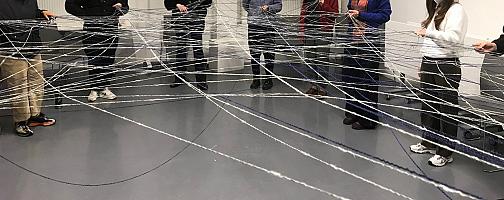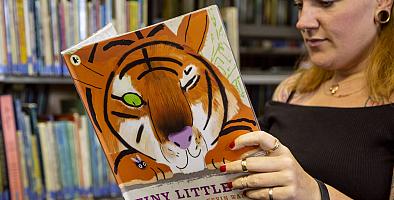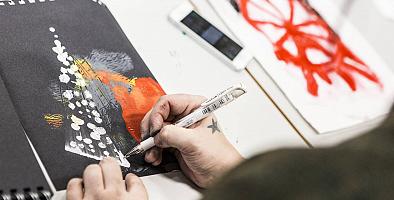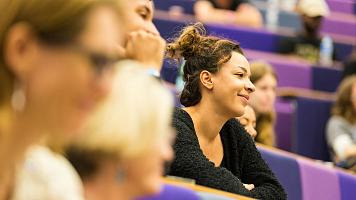MPhil/PhD
Art Practice & Learning
Content navigation menu
Why study MPhil/PhD Art Practice & Learning at Goldsmiths
What kind of learning emerges from and with art practice, and how does such learning further impact upon arts practice? This reflexive question lies at the heart of the MPhil/PhD Art Practice & Learning.
- The programme aims to promote practice research into the dialogical relations between pedagogical and art practices; a central purpose is to expand understanding of what both can become.
- Through an exploration and interrogation of the dialogical relations between arts practices and pedagogies, sites of practice and sites of learning you will engage with areas such as philosophical, political and aesthetic and material dimensions of learning and practice.
- A key feature of the MPhil/PhD Art Practice and Learning is that you will be part of the research community of the Centre for the Arts and Learning that meets regularly each term to discuss/share/debate research and ideas, and to discuss readings and art practice. This research community involves artists, academics, teachers etc.
Find out more about research degrees at Goldsmiths.
Contact the department
If you have specific questions about the degree, contact Tara Page.
Length
3-4 years full time or 4-6 years part-time
Entry requirements
You should normally have an undergraduate of least a second class classification and have (or expect to be awarded) a taught Masters in Education or a closely related area. You might also be considered if you can show that you have the ability to work at postgraduate level.
Fees
Home - full-time: £TBC
Home - part-time: £TBC
International - full-time: £19000
Department
You'll research
The outcomes of the practice research will consist of a practice component with a written thesis of which together articulate a coherent and integrated research study in which both components are viewed equally as contributing to the research. The written component must be able to demonstrate a clearly articulated research project and a rigorous theoretical engagement with the research focus, drawing upon, analysing and applying relevant literature.
The practice component must demonstrate an exploration and articulation of the practice research focus that draws upon domains of practice including visual or other practices to inform the research. The practice is not an 'illustration' to the written thesis.
The practice and written thesis should be appropriate to the inquiry and should be considered to complement and support each other and the research question(s) that govern the submission as a whole, including the length of the written thesis and the presentation of the practice.
The written thesis and the practice will be submitted concurrently and examined as a whole. The practice component could, for example, take the form of an exhibition(s), a film/video (approximately one hour in length), an installation, a web-based production, a performances, socially engaged work, sonic work or performance.
Supervision
You will be allocated two supervisors within the Department of Educational Studies but joint supervision with colleagues in other departments who have expertise relevant to your research may also be possible.
You'll be expected to attend Department research training and College research training and to participate whenever possible in Department research centre meetings.
Resources
The Department of Educational Studies has the theoretical and practical resources to support research, and it is able to draw upon important alliances and relations with cultural institutions that it has worked over many years, including, for example, Tate, Whitechapel Gallery, Showroom Gallery, 198 Gallery and Iniva.
The programme draws upon a team of dedicated staff in the Department of Educational Studies that is committed to developing this research.
Assessment
You will be assessed on a written thesis of between 30,000-70,000 words with practice, negotiated with the supervisor(s) and approved by Departmental PGR Committee, appropriate to the terms of the research.
The practice is not an 'illustration' of the written thesis. The practice and written thesis should be appropriate to the inquiry and should be considered to complement and support each other and the research question(s) that govern the submission as a whole, including the length of the written thesis and the presentation of the practice. The written thesis and practice will be submitted concurrently and examined as a whole.
Entry requirements
You should normally have an undergraduate degree of at least a second class classification and have (or expect to be awarded) a taught Masters in Education or a closely related area of the social sciences.
You might also be considered for some programmes if you aren’t a graduate or your degree is in an unrelated field, but have relevant experience and can show that you have the ability to work at postgraduate level.
International qualifications
We accept a wide range of international qualifications. Find out more about the qualifications we accept from around the world.
If English isn’t your first language, you will need an IELTS score (or equivalent English language qualification) of 6.5 with a 6.5 in writing and no element lower than 6.0 to study this programme. If you need assistance with your English language, we offer a range of courses that can help prepare you for postgraduate-level study.
How to apply
Apply directly to Goldsmiths using our online application system
Before submitting your application you'll need to have:
- Details of your education history, including the dates of all exams/assessments
- The email address of your referee who we can request a reference from, or alternatively an electronic copy of your academic reference
- Contact details of a second referee
- A personal statement – this can either be uploaded as a Word Document or PDF, or completed online. Please see our guidance on writing a postgraduate statement
- If available, an electronic copy of your educational transcript (this is particularly important if you have studied outside of the UK, but isn’t mandatory)
- Details of your research proposal
You'll be able to save your progress at any point and return to your application by logging in using your username/email and password.
Before you apply for a research programme, we advise you to get in touch with the programme contact, listed above. It may also be possible to arrange an advisory meeting (if appropriate).
Before you start at Goldsmiths, the actual topic of your research has to be agreed with your proposed supervisor, who will be a member of staff active in your general field of research. The choice of topic may be influenced by the current research in the department or the requirements of an external funding body.
If you wish to study on a part-time basis, you should also indicate how many hours a week you intend to devote to research, whether this will be at evenings or weekends, and for how many hours each day.
Research proposals
Along with your the application details requested and an academic reference, you should also upload a research proposal and a portfolio as a PDF or URL of your practice.
This proposal should be in the form of a statement of the proposed area of research and should include:
- Delineation of how you would approach the research topic, with reference to both academic sources and art works providing context to your practice
- Your rationale for the proposal - why you are interested in researching this area
- An initial focus, problem you wish to explore or research question
- How practice with theory are appropriate to your inquiry and how they will complement and support each other in benefitting learners at the gallery
- References to academic sources including practice research
- Up to 10 images, sound, film etc of your practice as part of your application. The images can be of present and/or past work/events/installation etc that are relevant to your research proposal
See our guidance on writing a research proposal.
When to apply
We accept applications from October for students wanting to start the following September.
We encourage you to complete your application as early as possible, even if you haven't finished your current programme of study. It's very common to be offered a place conditional on you achieving a particular qualification.
If you're applying for external funding from one of the Research Councils, make sure you submit your application by the deadline they've specified.
Selection process
You may be invited to an interview where you will be asked to further expand on your practice research focus and its theoretical framing as well as your recent arts practice of applicants.
Find out more about applying.
Fees and funding
Annual tuition fees
These are the PG fees for students starting their programme in the 2025/2026 academic year.
- Home - full-time: £TBC
- Home - part-time: £TBC
- International - full-time: £19000
If your fees are not listed here, please check our postgraduate fees guidance or contact the Fees Office, who can also advise you about how to pay your fees.
It’s not currently possible for international students to study part-time under a student visa. If you think you might be eligible to study part-time while being on another visa type, please contact our Admissions Team for more information.
If you are looking to pay your fees please see our guide to making a payment.
Funding opportunities
ESRC/SENSS Doctoral Studentships
Fully funded ESRC studentships are available to research students via this Doctoral Training Partnership (DTP).
Educational Studies MPhil/PhD research bursaries
The Department of Educational Studies in conjunction with its Research Centres is offering up to three PhD bursaries to prospective students with excellent proposals.
AHRC studentships
Goldsmiths is one of nine leading research institutions that are part of CHASE, the Consortium for the Humanities and the Arts Southeast England. CHASE funds up to 56 studentships per year across nine participating universities.
Explore the Goldsmiths scholarships finder to find out what other funding you may be eligible for.
Additional costs
In addition to your tuition fees, you'll be responsible for any additional costs associated with your course, such as buying stationery and paying for photocopying. You can find out more about what you need to budget for on our study costs page.
There may also be specific additional costs associated with your programme. This can include things like paying for field trips or specialist materials for your assignments. Please check the programme specification for more information.





